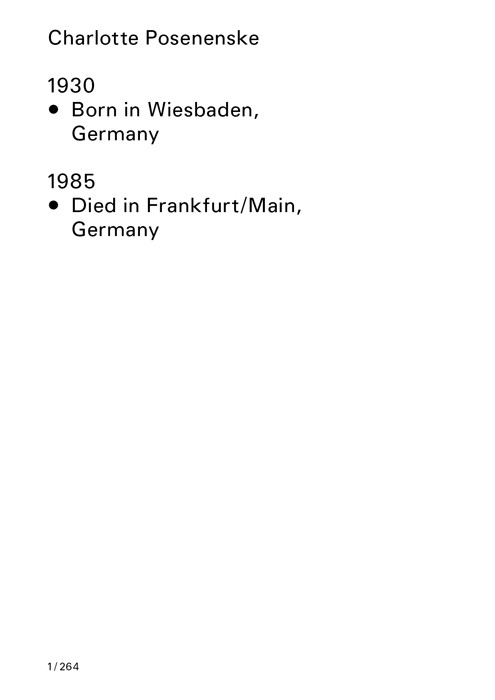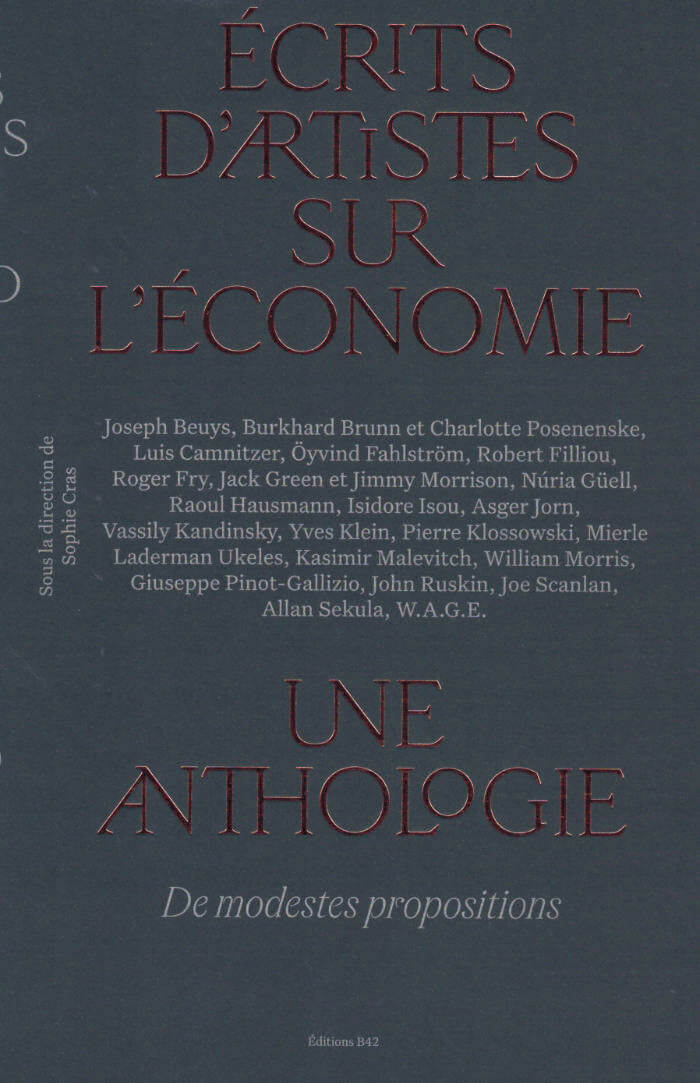Charlotte Posenenske
Charlotte Posenenske

Installation Views
Conceived as a visual résumé, Installation Views provides both a comprehensive overview of Charlotte Posenenske's solo exhibitions and a record of her numerous group shows.
In her Manifesto, Charlotte Posenenske stated: "I find it difficult to come to terms with the fact that art can contribute nothing to the solution of pressing social problems."
Developing her artistic practice throughout the 1960s, Posenenske produced a body of work that uniquely combined several strands of the art of the period: conceptualism, minimalism, and socially engaged participatory art. Her Manifesto, published in Art International in May 1968, lays out the social demands on art as well as the impossibility of fulfilling those demands. Shortly after its publication, Posenenske left the art world behind to pursue her studies in sociology, undertaking a new career in that field.
Conceived as a visual résumé, Installation Views provides both a comprehensive overview of Charlotte Posenenske's solo exhibitions and a record of her numerous group shows. The book features an essay written by curator Erlend Hammer on the role of documentary photographs in the circulation of works of art.
The book was published in conjunction with the eponymous show at the Haugar Art Museum in Tønsberg, Norway—the first full-scale presentation of the artist's oeuvre in Scandinavia. The exhibition showcased works from all the artist's major series of modular sculpture. Consisting of works made over the course of less than 12 months, between 1967 and 1968, preceding the abrupt end to Posenenske's career as an artist, the exhibition had the character of a snapshot. We are left wondering whether her withdrawal from the art world was a logical or necessary consequence of the development of the series. What are we to do with Posenenske's assertion that art is powerless to effectively change society for the better?
And more

Tell Them I Said No
This collection of essays by Martin Herbert considers various artists who have withdrawn from the art world or adopted an antagonistic position toward its mechanisms (essays on Lutz Bacher, Stanley Brouwn, Christopher D'Arcangelo, Trisha Donnelly, David Hammons, Agnes Martin, Cady Noland, Laurie Parsons, Charlotte Posenenske, and Albert York).
A large part of the artist's role in today's professionalized art system is being present. Providing a counterargument to this concept of self-marketing, Herbert examines the nature of retreat, whether in protest, as a deliberate conceptual act, or out of necessity. By illuminating these motives, Tell Them I Said No offers a unique perspective on where and how the needs of the artist and the needs of the art world diverge.
2nd edition (2025).

Vogliamo Tutto – Cultural Practices and Labor
Nicola Ricciardi, Samuele Piazza
Vogliamo Tutto. Cultural Practices and Labor has its origin in the novel Vogliamo tutto (1971) by Nanni Balestrini, whose protagonist Alfonso Natella became the voice of an entire generation as well as the workers' movements in 1968 Turin. In 2021, thirteen artists were invited to reflect on the change of labor in the contemporary context.
The result is a sum of choral voices and practices, which together outline the peculiar transformative nature of labor and its socio-cultural context over a wide time span: from the impact of the Industrial Revolution to the post-industrial decline and the shifts of the digital era.
The book features two essays by Samuele Piazza and Nicola Ricciardi, curators of the eponymous exhibition at OGR Torino; new writing by the artists Claire Fontaine and Tyler Coburn; and archive texts selected by the artists in the show: Andrea Bowers, Pablo Bronstein, Claire Fontaine, Tyler Coburn, Jeremy Deller, Kevin Jerome Everson, LaToya Ruby Frazier, Elisa Giardina Papa, Liz Magic Laser, Adam Linder, Sidsel Meineche Hansen, Mike Nelson, and Renate Wiehager for Charlotte Posenenske.
The archive texts include the essays "Automation and the Invisible Service Function" by Neda Atanasoski and Kalindi Vora; "Audio Poverty"Diedrich Diederichsen; "Sabotage" by Elizabeth Gurley Flynn; "Wages Against Housework" by Silvia Federici; "The Wreck of the Sea-Venture" by Peter Linebaugh and Marcus Rediker; "Charlotte Posenenske Mimetic Minimalism and Practicability" by Renate Wiehager; an excerpted texts from The Human Animal by Émile Zola; as well as the articles "A Game Designer's Analysis of QAnon" by Reed Berkowitz; "Manage Your Energy, Not Your Time" by Tony Schwartz and Catherine McCarthy; the "Letter of Protest, Frieze Art Fair, New York" by Andrea Bowers, and the "License Agreement" by the Cultural Capital Cooperative collective; the script from Erie by Kevin Jerome Everson; a conversation between David Green and Rick Smith, UAW Local 1112, and LaToya Ruby Frazier.
Contributions from Samuele Piazza, Nicola Ricciardi, Tyler Coburn, Claire Fontaine.
Reprinted archive texts by Neda Atanasoski & Kalindi Vora, Diedrich Diederichsen, Silvia Federici, Peter Linebaugh & Marcus Rediker, Renate Wiehager, Reed Berkowitz, Tony Schwartz & Catherine McCarthy, Andrea Bowers, the Cultural Capital Cooperative.

Écrits d'Artistes Sur L'Économie
Qu’advient-il de l’économie lorsqu’elle est pensée, inventée et rêvée par les artistes ? On le sait peu, mais nombreux furent celles et ceux qui, de la fin du XIXe siècle jusqu’à aujourd’hui, se firent un temps économistes, allant jusqu’à rédiger de véritables traités dont l’ambition affichée était de renouveler la discipline de fond en comble.
Qu’ils aient suivi une formation universitaire en économie, construit leur conception théorique de l’art en dialogue avec des économistes, ou élaboré un système théorique à part entière, ces artistes nous livrent une vision riche et singulière, tant sur la pensée économique de leur temps que sur les enjeux actuels. Valeur, travail, monnaie et capitalisme – autant de thèmes scrutés et revisités par ces textes, dont le présent ouvrage se propose de faire l’anthologie.
Avec: Joseph Beuys, Burkhard Brunn, Luis Camnitzer, Sophie Cras, Öyvind Fahlström, Robert Filliou, Roger Fry, Jack Green, Núria Güell, Raoul Hausmann, Isidore Isou, Asger Jorn, Vassily Kandinsky, Yves Klein, Pierre Klossowski, Mierle Laderman Ukeles, Kasimir Malevitch, William Morris, Jimmy Morrison, Giuseppe Pinot-Gallizio, Charlotte Posenenske, John Ruskin, Joe Scanlan, Allan Sekula, W.A.G.E. (Working Artists and the Greater Economy).